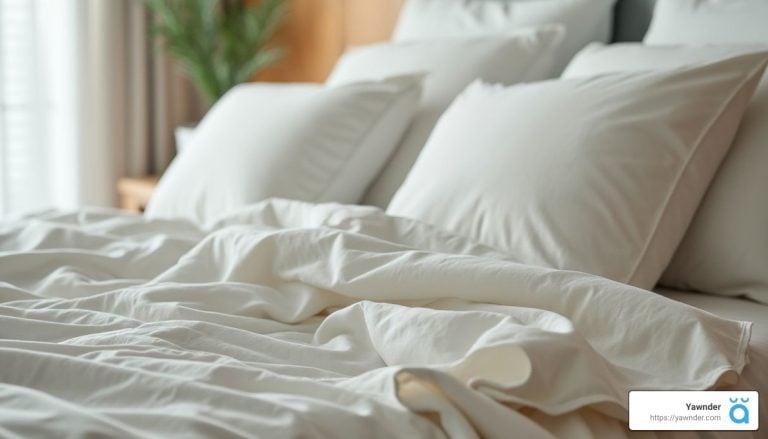The Complete Guide to Acne-Friendly Sheets
When it comes to battling acne, many people overlook an essential factor: their bed sheets. The right sheets can significantly impact your sleep environment and, ultimately, your skin health. Here’s your complete guide to finding the Best Sheets for Acne, ensuring you sleep soundly while supporting your journey to clearer skin.
Understanding the Connection Between Bedding and Acne
The fabric that envelops you at night can either help or hinder your efforts to maintain healthy, clear skin. Sweat, oils, and bacteria can accumulate on your sheets, affecting your complexion. By making informed choices about your bedding, you can create a space that promotes skin health.
Why Fabric Matters in Your Sleep Environment
Choosing sheets made from specific materials can be a game-changer for those with acne-prone skin. Here are some key attributes to look for when selecting bedding:
– Natural Fibers: Fabrics like organic cotton and bamboo are not only gentle but also breathable, promoting better air circulation.
– Hypoallergenic Properties: Sheets that are free from allergens can minimize irritation and breakouts.
– Moisture-Wicking Fabric: Look for textiles that help control oil and sweat, preventing clogged pores.
Top Choices for Acne-Friendly Sheets
Let’s dive into some of the best materials you can choose for your bedding to promote clearer skin.
Silk Sheets: Luxurious and Skin-Savvy
Silk sheets are an indulgent choice, especially for those with acne concerns. Their natural antibacterial properties help reduce acne-causing bacteria, while their moisture-wicking ability keeps your skin comfortable and dry overnight.
Moreover, silk’s smooth texture minimizes friction, making it ideal for sensitive skin prone to irritation. While silk can be a bit of an investment, the benefits for your skin health make it worthwhile.
Organic Cotton Sheets: Gentle and Breathable
Organic cotton sheets are a staple when it comes to acne-friendly bedding. This fabric is known for its hypoallergenic qualities, making it less likely to irritate delicate skin.
One of the most significant advantages of cotton is its breathability, allowing for proper air circulation and temperature regulation. This reduces excessive moisture accumulation, which can lead to clogged pores. For added softness and durability, choose sheets with a high thread count.
Bamboo Sheets: Eco-Friendly and Antimicrobial
Bamboo sheets have surged in popularity, thanks to their natural antimicrobial properties. These sheets are resistant to bacteria and allergens, making them an excellent choice for maintaining clear skin.
In addition to their skincare benefits, bamboo is an eco-conscious option, as it grows rapidly and requires fewer natural resources. Bamboo sheets are also incredibly breathable, helping to keep you cool and comfortable while you sleep.
Fabrics to Avoid for Acne-Prone Skin
While selecting the right sheets is crucial, avoiding unsuitable materials is just as important. Certain fabrics can exacerbate acne by trapping heat and moisture. Here are the types of sheets to steer clear of:
Flannel and Fleece: Cozy but Cumbersome
Flannel and fleece sheets may be warm, but they can create a breeding ground for bacteria. These materials retain heat, leading to increased sweating and moisture buildup. If you’re prone to acne, it’s best to avoid these fabrics.
Microfiber and Wool: Synthetic Struggles
While microfiber sheets may feel soft to the touch, they often trap moisture, leading to sweat and oil accumulation on your skin. Similarly, wool’s insulating properties can hinder breathability, making it another unsuitable option for acne-prone individuals.
Tips for Maintaining Clear Skin with Your Bedding
In addition to selecting the right sheets, proper bedding maintenance is essential for clear skin. Here are some practical tips:
Wash Your Sheets Regularly
Aim to wash your sheets weekly. This frequency helps eliminate sweat, oils, and bacteria that can accumulate over time. For maximum effectiveness, wash with hot water to kill any lingering germs.
Use Hypoallergenic Detergents
Opt for hypoallergenic detergents to cleanse your sheets. These products are typically free from harsh chemicals and fragrances that can irritate sensitive skin, ensuring your bedding remains skin-friendly.
Consider Your Pillowcase Material
Your pillowcase material greatly influences your skin’s condition. Silk pillowcases are highly recommended for their antibacterial properties and smooth surface, reducing friction and irritation. If you prefer absorbent options, choose organic cotton pillows, as they are breathable and hypoallergenic.
Frequently Asked Questions about Acne and Bedding
Can my bed sheets cause acne?
Yes, your bed sheets can contribute to acne breakouts. Fabrics that trap moisture or accumulate sweat and oils can irritate the skin and clog pores. Switching to breathable materials like cotton or bamboo can help reduce this risk.
How often should I change my sheets to prevent acne?
Ideally, wash your sheets once a week. If you tend to sweat heavily at night or have exceptionally sensitive skin, consider washing them even more frequently.
What is the best pillowcase material for acne-prone skin?
Silk pillowcases are highly recommended due to their smooth texture and antibacterial qualities. Organic cotton is another excellent choice, as it allows for good airflow.
Conclusion
The right bedding is a vital component of your skincare routine. By selecting Best Sheets for Acne, such as organic cotton or bamboo, you can foster a sleep environment that supports healthier skin. In addition, taking care of your bedding through regular washing and choosing suitable pillowcase materials will further assist in preventing breakouts.
Choosing wisely not only enhances your sleep quality but also gives you the confidence to wake up to clearer skin. Make informed decisions about your bedding to create a sanctuary for restoration and beauty—because your skin deserves the best.

